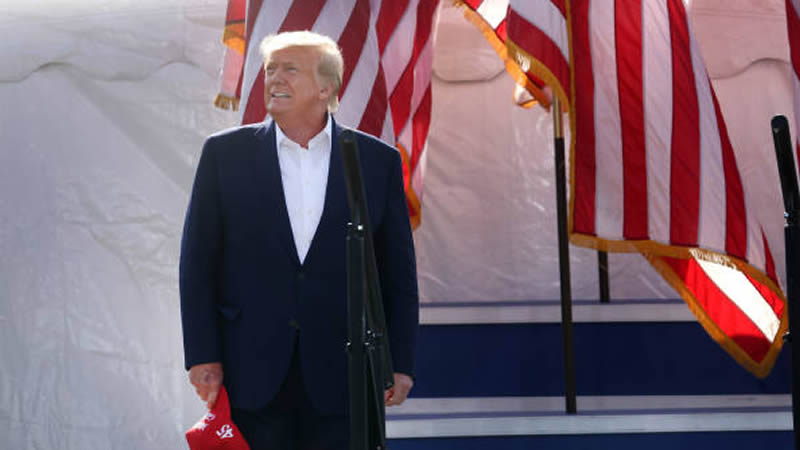“Drill, Baby, Drill” Won’t Lower Rent: Trump’s Response Leaves Voter Unsatisfied

(image credit: Getty Images)
In a televised call-in during a “Fox & Friends” segment on Wednesday, former President Donald Trump was given the opportunity to address a voter’s concerns about the rising costs of living, particularly the affordability of housing. However, instead of offering concrete solutions, Trump reverted to his well-known rhetoric, promising to “drill, baby, drill” and vowing to make China “behave properly.”
The voter, who was attending the Sturgis Motorcycle Rally in South Dakota, shared his personal struggles, revealing that five of his eight children rely on his financial support as they grapple with the rising costs of essential goods. “How are you going to make the economy—not just the food and electricity—but bring down the rent prices, the housing prices, so that these kids can survive without their parents’ help?” the voter asked, hoping for a meaningful response.
Rather than addressing the voter’s question directly, Trump turned to the Fox correspondent, boasting about his support at the event before delivering a meandering answer. “We’re going to drill, baby, drill, we’re gonna bring down the cost of energy,” he said, asserting that energy prices were the root cause of what he called “the worst inflation in the history of our country.” He further claimed that food prices had skyrocketed, using the example of bacon, which he said had “quadrupled.”
While Trump attempted to connect energy costs to broader economic issues, his statements were factually questionable. For instance, during Trump’s last year in office, a pound of bacon cost $5.83; today, it costs $6.77, not the drastic increase he implied. Additionally, his claim that the U.S. is experiencing its “worst inflation” is misleading. While inflation surged during the pandemic, it has since decreased, reaching 3% in June.
Trump’s response did not address the central concern of the voter—how to make housing more affordable. Instead, he shifted the conversation to international relations, promising to ensure that China and other countries would “treat us good.” His failure to provide a direct answer led to criticism from several quarters.
Derek Marshall, a progressive congressional candidate from California’s 3rd District, criticized Trump’s response, stating, “Answering with ‘drill baby drill’ to a concerned supporter asking about rising rent prices is about as asinine as it gets. Americans deserve better!”
Jonathan Wilson-Hartgrove, assistant director of the Yale Center for Public Theology & Public Policy, echoed these sentiments, highlighting the contrast between Trump’s approach and the more policy-focused responses from Democratic candidates. Wilson-Hartgrove cited Vice President Kamala Harris’s 2020 proposal for a Rent Relief Act, which aims to provide tax credits to renters who spend more than 30% of their income on rent and utilities.
Wilson-Hartgrove urged voters to “hear the contrast between these two visions of the economy.” He noted that while Harris is now pushing for measures to cap unfair rent increases, Trump offered no tangible solutions to address the pressing issue of affordable housing.
Rev. Dr. William J. Barber II, co-chair of the Poor People’s Campaign, also weighed in, condemning Trump’s response as misleading and insufficient. “‘Drill, baby drill’ doesn’t help people with housing needs,” Barber said. “We need living wages and investment in affordable housing.”
As the 2024 election approaches, the stark differences in economic strategies between the candidates are becoming increasingly apparent, with voters left to decide which vision aligns with their needs and concerns.


